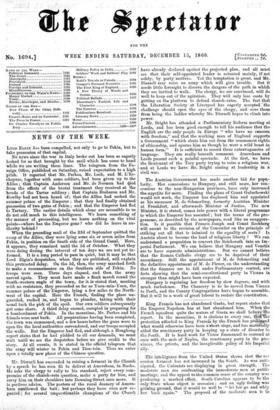The Austrian Government has made another bid for popu- larity.
•dler concessions to Hungary, and still more, her con- cessions to the non-Hungarian provinces, have only increased thaappelite for.more. Finding the plans of Count Guluchowslii would not work, the Emperor has displaced him and appointed as his successor M. de Schmerling, formerly Austrian Minister at Frankfort, and afterwards Minister of Justiee. The new Minister, it is stated, comes into power with a liberal programme to which the Emperor has assented ; but the terms of the pro- gramme, as described by the newspapers, read like an exaggera- tion. Is it possible that Francis Joseph and taunt Rechberg will assent to the revision of the Concordat on the principle of striking out all that is inimical to the equality of sects ?
Austria about to become the land of religious liberty? We can understand a proposition to convert the Reichsrath into an Im- perial Parliament. .We can believe that Hungary , and Venetia are to have separate administrations. But we cannot believe that the Roman Catholic clergy are to be deprived of their ascendancy. Still the appointment Of M. de Schmerling and. the definitive appointment of M. de Plener, on the understanding that the finances are to fall under Parliamentary control, are facts showing that the semi-constitutional party in Vienna is stronger than might have been expected.
Hungary is regaining her freedom by slow degrees, and with much turbulence. The Chancery is to be moved from Vienna to Pesth, and the County Congregations have begun to assemble. But it will be a work' of great labour to restore the constitution.


























